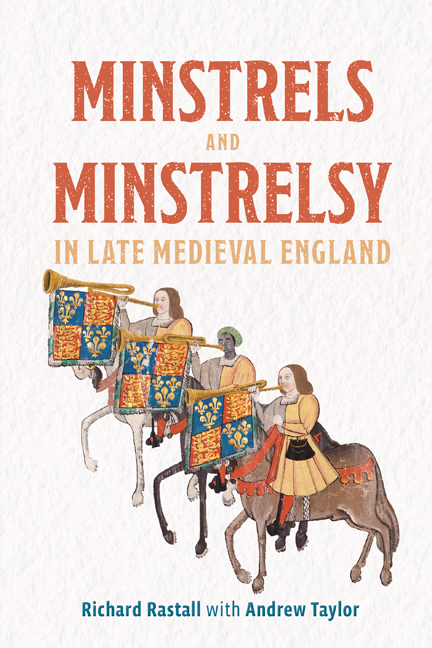Book contents
- Frontmatter
- Dedication
- Contents
- List of illustrations
- List of music examples
- List of abbreviations
- A note on references
- A note on money
- A note on dates
- Preface
- Acknowledgments
- Part I Minstrels and Minstrelsy in the Elite Households
- Part II Urban Minstrelsy
- Part III On the Road
- Part IV Minstrel Performance
- Envoi
- Bibliography
- Index
12 - Professional recitation before the fourteenth century
Published online by Cambridge University Press: 09 January 2024
- Frontmatter
- Dedication
- Contents
- List of illustrations
- List of music examples
- List of abbreviations
- A note on references
- A note on money
- A note on dates
- Preface
- Acknowledgments
- Part I Minstrels and Minstrelsy in the Elite Households
- Part II Urban Minstrelsy
- Part III On the Road
- Part IV Minstrel Performance
- Envoi
- Bibliography
- Index
Summary
The joglars as wanderers or travellers The one substantial body of medieval poetry that almost everyone agrees was regularly performed by professionals is that of the troubadours, the poets who composed love lyrics and satires in Old Occitan (or, as it is still sometimes called, Old Provencal) from the eleventh to the thirteenth centuries, and sometimes later, and their professional reciters, the joglars. On the whole, poets working in English seem to have drawn more heavily on Northern French traditions, often transmitted through Anglo-Norman works, but England maintained extensive ties to the south, above all in Aquitaine, which remained an English possession until 1453. The practice of the joglars may, therefore, provide insights into the later practice of the English minstrels.
The distinction between troubadour and joglar was never a firm one. An impecunious troubadour might act as his own joglar, a gifted joglar compose his own material. It also seems likely that during their own lives many a joglar and many a troubadour would have performed a variety of functions at the court; the categories impose an artificial clarity. The vidas, or short life stories, of the troubadours provide numerous examples of less fortunate troubadours who travelled the country reciting their own verse. The more desirable pattern, however, at least for the more prosperous, was to entrust the performance to a professional singer, the joglar. Many of the joglars are identified in the final lines of the poems, as when Bertran de Born concludes his plaint Dompna, puois de mi no’us cal (‘Lady, since you don't care for me’) by calling on his joglar Papiol to visit the lady.
The other rich source of information about these singers is found in the sirventes joglaresc and enshamen-sirventes (satires against joglars and satires to teach joglars), in which a troubadour heaps abuse, often in the guise of instruction, on his own performer. Thus we hear, for example, the Catalan nobleman Guera de Cabrera complaining that his joglar Cabra (Goat) cannot play the veille properly, nor sing well, nor leap like the Gascon joglars, and is ignorant of a long list of songs, including those on famous heroes such as Augier (Ogier the Dane), Olivier (Roland's companion), and Girart de Rossillon (the hero of a famous chanson de geste).
- Type
- Chapter
- Information
- Minstrels and Minstrelsy in Late Medieval England , pp. 268 - 289Publisher: Boydell & BrewerPrint publication year: 2023

